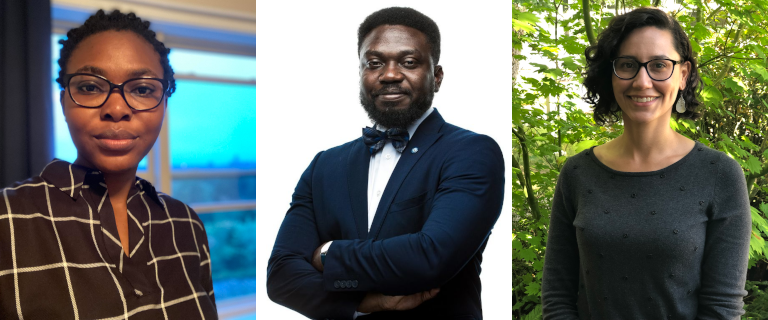Faculty of Law announces three new hires
Law Communications Team - 7 June 2022

Left-to-right: Faith Aboyeji, Godwin Dzah, and Rebeca Macias Gimenez
The University of Alberta Faculty of Law is very proud to introduce three prominent scholars who will be joining us in the next few months. Two of these hires, Faith Aboyeji and Godwin Dzah, are part of the university’s Black Academic Excellence Cohort Hire.
“We are very excited to have Faith, Godwin, and Rebeca join the Faculty. I am confident that their respective legal expertise and research in rapidly expanding areas of law will positively advance the educational experience of our students and our scholarly mission," said Dean Barbara Billingsley.
Continue reading to learn more about the new faces you’ll see around the Law Centre as we look ahead to the start of another memorable academic year.
Faith Aboyeji
On July 1, Faith Aboyeji will join the Faculty as assistant professor. Her research focuses on intellectual property and public interest, with specific emphasis on the nexus between copyright and global development goals. She is also researching the adaptation of copyright laws to support digital education in a pandemic and post-pandemic world.
Aboyeji holds a Berkman Klein Fellowship at the Berkman Klein Center for Internet and Society, Harvard University. She has also held the Schulich Fellowship at the Schulich School of Law, Dalhousie University, and a research fellowship at the prestigious Max Planck Institute for Innovation and Competition in Germany.
Aboyeji graduated from the University of Ilorin, Nigeria and the Nigerian Law School, and practised with one of the foremost law firms in Nigeria. She recently completed her PhD in international copyright law and human development at RMIT University, Melbourne, Australia.
As a faculty member, Aboyeji hopes to design a course in Enterprise Law that will adopt experiential learning methods to equip students to design legal solutions for entrepreneurs and start-ups.
“I am looking forward to working with the faculty and students at UAlberta Law and fostering collaborative research on intellectual property (IP) and public interest in IP goods,” Aboyeji said. “My work thrives on interdisciplinary engagements. The unique location of UAlberta Law within the College of Social Sciences and Humanities puts me in closer proximity to non-law researchers who are equally essential to my research area.”
Godwin Dzah
The Faculty will welcome Godwin Dzah as assistant professor on July 1. Until his appointment, Dzah held a position as Provost’s Postdoctoral Fellow at Osgoode Hall Law School, York University.
“The opportunity to be part of and contribute to the exceptional work going on here makes me very excited to be joining the University of Alberta community. I am looking forward to sustaining the cosmopolitan outlook on teaching and research that the Faculty of Law is already known for. I am also thrilled to be able to support the many wonderful and talented students at the law school,” he said.
Dzah, who previously practised as an attorney and taught law in Ghana, focuses his research on international environmental law, public international law, climate change and sustainable development law. Dzah earned both a BA and LLB from the University of Ghana, a Qualifying Certificate in Law at the Ghana School of Law, and an LLM from Harvard Law School.
He completed a United Nations-Nippon Foundation fellowship at the Schulich School of Law, Dalhousie University and the Division for Ocean Affairs and the Law of the Sea, Office of Legal Affairs at the United Nations Secretariat. He also holds a PhD in Law from the Peter Allard School of Law, University of British Columbia, where his dissertation, Sustainable Development: Africa’s Hidden and Not-So-Hidden Contribution to its Law, Politics and History, was awarded the Dean’s Prize for the Best Doctoral Thesis in Law.
When it comes to his approach to teaching, Dzah said adaptability is key. “My approach to teaching is to develop in students a balanced understanding of legal rules and an equivalent ability to apply these rules to real-life situations. But more importantly, my teaching approach is informed by the understanding that learning is a lifelong activity. So, I aim to sustain the interest of students even beyond the classroom,” he said.
An established writer of a number of publications relating to environmental law, international law and law of the sea, his work has appeared in peer-reviewed journals including the African Journal of International and Comparative Law and the Ocean Yearbook. Dzah recently co-authored The African Human Rights System as ‘Norm Leader’: Three Case Studies that was published in the African Human Rights Law Journal in 2021.
Dzah has consulted locally and internationally for state agencies, international organizations, and research institutions in the areas of environmental law, law and development, and human rights in Ghana and other parts of Africa as well as in Canada.
Rebeca Macias Gimenez
Rebeca Macias Gimenez will join the Faculty as a full-time assistant lecturer beginning September 1. Macias Gimenez – who holds a PhD from the University of Victoria where she focused on Indigenous and environmental issues – brings a wealth of knowledge and experience to this position.
During the Fall and Winter terms of the 2022-23 school year, she will teach Constitutional Law to first-year students. During the Winter term, she will also teach a course on Indigenous peoples and the law.
“When I first learned the news I was thrilled,” said Macias Gimenez of being offered the new role. “It will be an honour to share some of my experiences and interests with students.”
Macias Gimenez is already acquainted with the Faculty. Since 2021 she has been pursuing postdoctoral work remotely at the Faculty under Professor Hadley Friedland's supervision. As part of this work, she has been examining how the Dunne-zaa and Cree communities on Treaty 8 territory in northern British Columbia affirm jurisdiction over their territory and make decisions about natural resources.
“The University of Alberta has one of the best law schools in Canada, she said. “I am looking forward to being part of this community!”